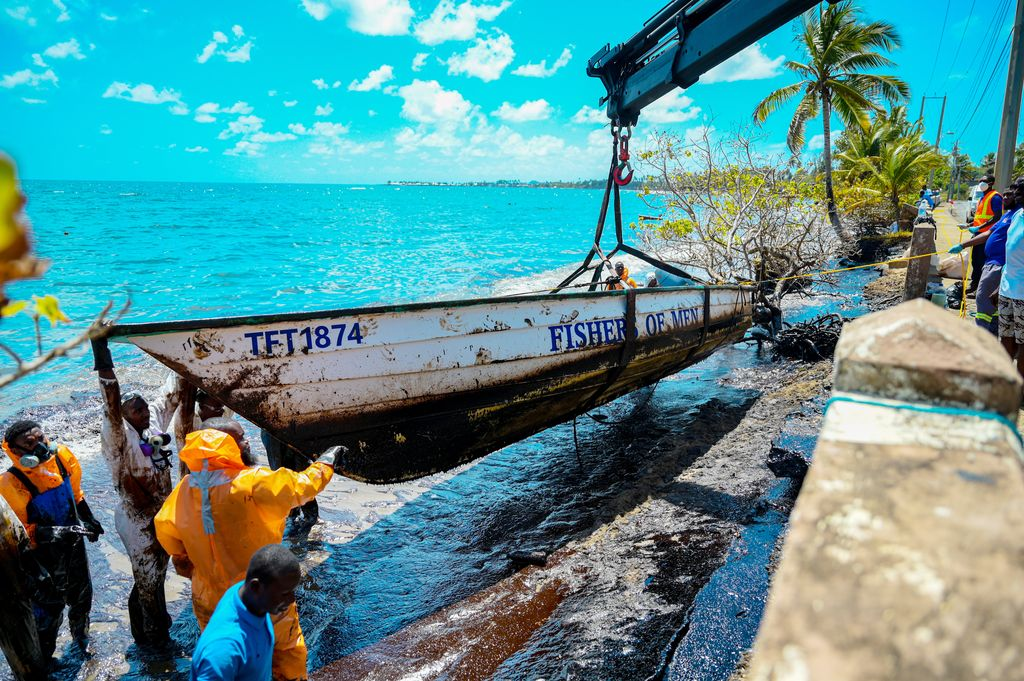(Trinidad Guardian) One would think that those residing in the heart of a disaster are the ones most affected. However, this is not the case for Lambeau residents, as many have continued their daily lives unbothered by the fumes flowing through their homes and the oil deposits layering their shoreline.
It’s been two weeks since a barge crashed near the coast of Cove, metres away from Lambeau, spewing gallons of oil into the water and making its way onto the shoreline.
Although Scarborough has been cleaned up, Lambeau, a tiny fishing village resting on the outskirts of the west of the island, remains devastated.
The oil spill incident has robbed fisherman Kenwin Ramkissoon of his only form of income. He could not get his vessel, Fisher of Men, out of the water in time when the Gulfstream was first discovered overturned on February 7, and so his boat remained stuck in the oil until Thursday.
Members of the Tobago Emergency Management Agency visited Lambeau Bay, near the village’s fishing facility, to pull Ramkissoon’s vessel from oil-slicked water. The vessel remained in the water for that long because it was too risky to not only drive it in but also to go through the oil to bring it closer to shore. Luckily, on Thursday, the vessel eventually ran aground. But after the long wait, Ramkissoon realised he had lost everything onboard.
“Whole morning I’m sweating, my hands shaking. My whole nervous system just broke down. Seeing they trying to help me but I really can’t watch the boat. I can’t watch it. I (sic) feeling bad in my stomach. All my equipment on the boat. I have to get back money to buy those back. It’s covered in oil. I don’t have money.
“It’s hard. I have my rent to pay. How will I pick up from this? I need help from somebody. I’m not asking for much, just about $5,000 will help me right now. While they focus on the spill, the fishermen are not fish vendors. How will we cope until this is under control to start compensation talks?” he said.
Ramkissoon became emotional, and before the interview could end, he walked away in tears as officials lifted the oil-covered vessel away.
‘It’s not making
me feel no way’
However, the mood was quite different for other residents living in other parts of Lambeau.
Thomas McClatchie, a retiree, said he remains unfazed by the disaster. He even took a deep inhale while sitting on his porch to prove to Guardian Media that he was unbothered and unaffected by the stench.
“It’s not making me feel no way. Because I do less inhaling of it. Some people telling me we should move from here. If it was affecting me, I would have moved out. Now and then I would get a scent but it’s nothing much to talk about.
“It’s not to say it’s something heavy you’re getting. Me and my family are coping well,” said McClatchie.
Still, he said he is concerned about the island’s economy in the coming years.
“I don’t like this whole situation. From different things I’m reading and hearing, I don’t know who telling the truth or lies. I just hope everything is back to normal soon. I know the community is hit bad.”
Closer to the affected area, just a couple of streets away, one mini-mart owner, Osborne Bruno, said his main concern was how this disaster would affect his pocket.
“I have to go ahead and do business. This is what I’m living by, my bread and butter. I don’t feel no how, I’m coping with it and going with the flow. I keep my doors closed because I get the fumes when I’m outside,” said Bruno.
His store was empty, with fresh pies that normally sell quickly, resting in a warmer for some time.
“I grew up in a rough community, so I learned to relax and go through to make this happen. What will fussing do?” he asked.
The Lambeau Anglican Primary School remained closed, fishing vessels remained grounded, and the main road was restricted, as tanks vacuumed fuel into a containment storage. However, the fumes did not affect the reopening of the Doughty Moses Preschool just streets away. The school’s director, Verlene Williams, said the parents were satisfied that the area is safe to send their toddlers back to classes.
“We are quite okay here. But, from what I have seen, when you pass on the seacoast and look it’s really terrible, the spill on the road is really a disaster. But for here, even for the neighbours, I have never heard anyone complain.”






